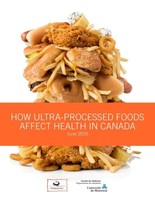Keep it real: Simpler is better when it comes to healthy eating
First of its kind research in Canada links ultra-processed food consumption to ill health
OTTAWA, June 27 2019 /CNW/ - New research commissioned by Heart & Stroke reveals for the first time that diets high in ultra-processed foods are linked to obesity, diabetes and high blood pressure. These are all risk factors for heart disease and stroke.
Canadian adults who consume the highest amounts of ultra-processed foods have 31% higher odds of developing obesity, 37% higher odds of diabetes and 60% higher odds of high blood pressure.
"This is the first study in Canada to provide evidence that high intake of ultra-processed foods and beverages is significantly associated with the prevalence of multiple chronic conditions," says Dr. Jean-Claude Moubarac, an assistant professor at the University of Montreal, and author of the report. "This adds to the growing body of international evidence around how ultra-processed foods affect health."
Recent studies from France and Spain reported that diets high in ultra-processed foods increase the risk of obesity, hypertension, cancer, and cardiovascular disease, and a US study showed how ultra-processed foods encourage overeating.
Overall consumption of ultra-processed foods by adults in Canada is alarmingly high at 47% of daily calories – consistent across all socio-demographic groups, with the exception of people born outside Canada. A previous study by Dr. Moubarac revealed that young people between 9-13 years get almost 60% of their calories from ultra-processed foods.
"Not only do ultra-processed foods not contribute to a healthy diet, but they displace other healthier foods that do. The higher the consumption of ultra-processed foods, the lower the consumption of real, whole foods," says Dr. Moubarac.
Ultra-processed foods contain little, if any, intact food. They are often high in calories, free sugars, sodium or saturated fats and are branded assertively, packaged attractively, and marketed intensively.
With the proliferation of processed, packaged and ready-made foods in Canada and their negative effects on health, stronger food policies and guidelines are required.
"It is time to change our food environment to support people to make healthy choices by cooking more often and choosing whole, minimally processed foods," says Yves Savoie, CEO, Heart & Stroke. "We need to implement policies such as mandatory front-of-package nutrition labelling and restrictions on food and beverage marketing to kids."
The annual cost of diet-related disease in Canada is $26 billion. Canadians are the second largest buyers of ultra-processed foods and drinks in the world; second only to Americans.
About Heart & Stroke
Life. We don't want you to miss it. That's why Heart & Stroke leads the fight against heart disease and stroke. We must generate the next medical breakthroughs, so Canadians don't miss out on precious moments. Together, we are working to prevent disease, save lives and promote recovery through research, health promotion and public policy.
SOURCE Heart and Stroke Foundation

Stephanie Lawrence, Senior Manager, Policy, Heart & Stroke, 613.691.4022 or 613.290.4236, [email protected]

Share this article